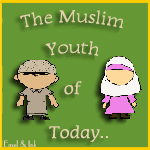Problems that recur in the heart of the teenager
Misgivings and evil thoughts keep recurring on a dead heart which contradicts Deen. It is for this reason that when it was said to Ibn Masud or Ibn-e-Abbas (Radiallaahu anhum) that the Jews say that they do not get evil thoughts in their prayers, i.e. they do not experience apprehensions, he replied, ''They have spoken the truth, what can Shaytaan do with an empty heart?"
If the heart is alive and there is even a bit of Eemaan (faith) in it, then Shaytaan attacks it. His attack is devoid of leniency and sluggishness. He throws in the heart such evil thoughts which are detrimental to Deen. It is most destructive if the servant accepts these evil thoughts until Shaytaan induces him to create doubts in his Lord, Deen and beliefs. If he finds in the heart any weakness and frustration, Shaytaan overwhelms that heart until he takes it out of the confines of Deen. However, if he finds in the heart strength and steadfastness, he devises a contemptible scheme to mislead the servant.
These evil thoughts that Shaytaan casts in him will not harm a person if he practices the therapy mentioned by Rasulullah sallallaahu 'alayhi wa sallam concerning it. Ibn-e-Abbas (RadiAllaahu anhuma) narrates that a person came to Nabi sallallaahu 'alayhi wa sallam and said: "I am having a certain feeling within myself which a burning ember is more desirable to me than my uttering it." Nabi sallallaahu 'alayhi wa sallam said: "All praise is due to Allah who has rejected his scheme i.e. driven away Shaytaan's evil thoughts." (Hadith)
Some people from the Sahabah (companions) came and said, "O Messenger of Allah, we find within ourselves (such a feeling) which overwhelms each one of us from speaking about it i.e. he feels it imposing to speak about it." Nabi sallallaahu 'alayhi wa sallam asked: "Do you also experience it?" The companions replied, "Yes."
Nabi sallallaahu 'alayhi wa sallam replied, "That is true faith (Eemaan)." The meaning of having true faith is that evil thoughts and your rejection of them does not harm your Eemaan even a bit but it is a proof that your Eemaan is sincere and has not been affected by any loss. Nabi sallallaahu 'alayhi wa sallam has said: "Shaytaan (the devil) comes to one of you and says. Who has created this? Who has created this? Until he says: Who has created your Lord? When he reaches this limit, then seek refuge in Allah and in his compassion." (Hadith)
It is stated in another Hadith regarding the same situation: "You should say: I believe in Allah and his messengers." And in a similar Hadith that Abu Dawood has narrated, Nabi sallallaahu 'alayhi wa sallam said: "Say Allah is one, Allah is independent, He does not give birth nor was he given birth to. Then blow a little saliva towards the left thrice and seek refuge from the accursed Shaytaan."
Once the Sahaaba (RadiAllaahu anhum) described this ambition to Nabi sallallaahu 'alayhi wa sallam for which he prescribed the cure in four steps:
1. The termination of evil thoughts by completely shunning and forgetting them until they do not exist and then occupying oneself away from these thoughts with balanced thinking.
2. Seek refuge in Allah from these evil thoughts and from the accursed Shaytaan.
3. He should say, “I believe in Allah and his Messengers.”
4. He should say, “Allah is one, Allah is independent, He does not give birth nor was he given birth to, there is none comparable to Him.” Spit to his left side thrice and say, "I seek refuge in Allah from the cursed Shaytaan."
Confusion regarding the issue of predestination
From those issues which keep recurring and leaves the youth bewildered is the issue of predestination. Belief in predestination is one of the pillars of Eemaan and Eemaan is not complete without it. This belief entails the belief that Allah, who is pure, knows what is going to happen and what is predestined for the skies and earth, as Allah says: "Don't you know that Allah knows all that is in the heaven and on the earth? Indeed, it is all in a record and it is easy for Allah." [22:70]
Nabi sallallaahu 'alayhi wa sallam has prevented us from quarrelling and debating in the matter of predestination. Abu Hurairah (RadiAllaahu-anhu) relates that RasullAllaah sallallaahu 'alayhi wa sallam came to us while we were debating about predestination. Seeing this he became angry until his blessed face turned red with anger. Then he said: "Did I order you to do this? Is it for this that I was sent to you? The nations before you were destroyed when they debated this issue. I take a firm resolution from you that you will not quarrel on this matter." (Hadith)
Engrossing oneself and quarrelling in the matter of predestination lands a person in a maize from which he does not have the ability to emerge. The path of salvation is that you should aspire to do good and strive in the doing of good as you have been ordered because Allah, who is pure, has granted you intellect and understanding, and sent to you Messengers and revelation with them. Allah Ta'ala says, "So that mankind, after the coming of the Messengers, should have no proof against Allah for Allah is Exalted in Power and Wise." [4:165]
When Nabi sallallaahu 'alayhi wa sallam informed his companions that there is no person except that his abode in Jannah (heaven) and Jahannam (hell) has been foreordained, they said, "O Messenger of Allah, should we not depend upon our book (predestinations) and leave the doing of good deeds." Nabi sallallaahu 'alayhi wa sallam replied: "Do good deeds, everything is made easy for what it was created. Those who are from the fortunate people, the actions of fortunate people will be made easy for them, and those who are from the wretched people, for them the actions of the wretched will be made easy." Then the Messenger of Allah sallallaahu 'alayhi wa sallam recited the verse: "He who gives in charity and fears (Allah), and in all sincerity testifies to good, We will indeed make smooth for him the path to ease, but he who is a greedy miser and thinks himself self-sufficient and disbelieves in good, We will indeed make his path to adversity easy." [92:5-10]
Nabi sallallaahu 'alayhi wa sallam ordered them to do good deeds and did not permit them to depend upon their preordainment because those who are predestined to be from the people of Jannah will not be from amongst them except if they do not do the actions and deeds of the people of Jannah, and those who are predestined to be from the people of Hell will not be from amongst them except if they do their actions. Action is according to the ability of a person because he himself knows that Allah has given him a choice in the doing of action and predestined it for him. If he wishes, he can either do it or leave it.
If a man makes an intention to travel, then he will travel and if he intends halting, then he will do so. If he sees a fire, he will flee from it and if he sees a thing which is beloved to him, he will go forward. Similarly with regards to obedience and sin, a person practices them by his own choice and leaves them by his own choice.
There are two objections according to some people regarding the issue of predestination:
1. Man sees that he does something by his own choice and he leaves all action by his own choice without perceiving any compulsion upon the doing or leaving of an action, so how does this coincide with the belief that everything is with the decree and foreordainment of Allah? The answer to this is that if we contemplate the action and movement of man, we will find that it is the result of two things, intention i.e. the choice to do something, and ability. If these two things are not found, the action will not occur. Intention and ability are both the creation of Allah, who is Most Pure, because intention is the result of the strength of the mind and ability is the result of the strength of the body. If Allah so wishes, he can snatch away the mind of man and he would be left without any intention or snatch away his ability leaving action impossible for him. When man makes a firm intention to do an action and he executes it, it is our knowledge with conviction that Allah had intended and destined that action, otherwise his intention would have changed or he would have found a barrier between himself and his ability to carry out that action. A Bedouin was asked, "How do you recognize Allah?" He replied, "By the breaking of firm intentions and the changing of resolutions."
2. The second objection which recurs according to some people in the matter of predestination is that man will be punished for his sinful deeds. How can he be punished for it when it is predestined for him and it is not possible for him to escape from something which is predestined for him. How is he rewarded for his obedience when it is predestined for him and it is not possible for him to escape from something which is predestined for him? It is unjust that you make predestination an argument for disobedience while you do not make it an argument for obedience. The second answer is that Allah has negated this argument in the Qur'aan and classified it as an ignorant statement. Thus Allah Ta'ala says, "Soon the idolaters will say, if Allah willed we would not have ascribed partners to Allah nor would our fathers have, nor would we have forbidden anything. In the same way their ancestors argued falsely, until they tasted our wrath. Say, have you any (certain) knowledge? If so, produce it before us. You follow nothing but presumption and you only lie." [6: 148]
Allah Ta'ala has explained that these objectors of predestination, have in their ranks those who were before them, who falsified (the Messengers) the way these people falsify (the Prophets), and they remained firm upon this action of theirs until they tasted Allah’s punishment. If their proof was correct, Allah would not have made the taste of His punishment. Then Allah ordered his Nabi to challenge them to prove the correctness of their beliefs and explain to them that they have no proof for this.
The third answer is that preordainment is a hidden secret. Nobody knows about it except Allah until it happens. How can a sinner have knowledge about the act that Allah has predestined for him until he does it? Is it not possible that Allah had ordained for him obedience? So why does he not in place of going towards sin, go towards obedience and say Allah has definitely predestined for me that I obey him?
The fourth answer is that Allah has blessed man by what he has given him of intelligence and understanding, and revealed upon him books and sent to him messengers and outlined to him what is beneficial and what is non-beneficial and blessed him with intention and ability with which he has the power to traverse either path. So why does this sinner choose the path of harm over the path of benefit?
If this sinner intended going on a journey to another place and he had two roads to choose from, one is easy and peaceful and the other difficult and frightful, he most definitely would traverse the easy, peaceful path and not the difficult, frightful path because of the argument that Allah had predestined it for him. If he traversed the path of difficulty and used the argument that Allah had predestined it for him, people would think of him as being naive and insane. In the same way are the paths of good and evil. Man will traverse the path of good and not deceive himself by traversing the path of evil on the pretext that Allah had predestined it for him. We see that every person has the ability to earn his livelihood. We see that he traverses every path in the gaining of his livelihood. He does not sit in his house and leave earning, holding on to the excuse of predestination.
Otherwise, what is the difference between striving for the world and striving in the obedience of Allah? Why do you make divine preordainment a proof for yourself upon the leaving out of obedient and you do not make it a proof for the leaving out of worldly action? The clarity of an argument is in its place but desires make a person blind and deaf.
TO BE CONTINUED...
Source: http://www.kalamullah.com/youth01.html
Subscribe to:
Post Comments (Atom)





No comments:
Post a Comment